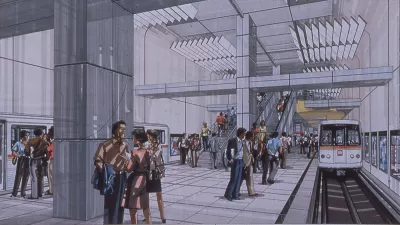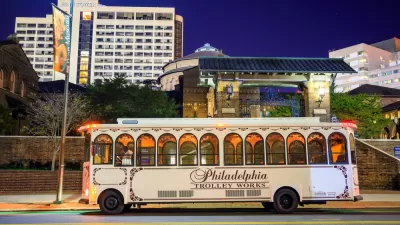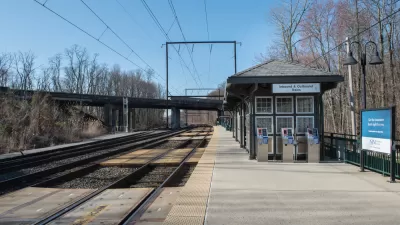In PlanPhilly, a discussion on Jarrett Walker's brand of humanities-infused transit planning. The wonky stuff is all well and good, but in the end it's all about simple access and freedom of movement.

"'Frequency is freedom,' said Jarrett Walker, earnestly in a philosophy lecture disguised as a talk on transit planning." [...] "'We all have a sense about freedom and imprisonment—It's about not being able to move. We are all in a prison, physically speaking, where the walls are where we can get to in a reasonable amount of time.'"
Jim Saksa writes about Walker's approach to transit planning, emphasizing the human dynamic before getting technical. For one thing, Walker insists on distinguishing between the "choice" rider (someone who has another option) and the "dependent" rider (somebody who must take the bus). "Imagine what kind of service the dependent bus rider would want, and deliver that, rather than trying to dream up a service for the choice rider."
Walker tends to eschew ridership predictions and overly-complex models. "It may be my philosophical training: I start with skepticism. [...] I start with what I know. That's why I start with geometry—I'm sure about that, and in a way that I'm not sure with psychology or human behavior."
Saksa suggests that SEPTA can take several lessons from Walker. "First, Walker emphasized the importance of maps—particularly frequency maps—in conveying the freedom offered by a transit system to its potential riders. Second, Walker noted that straight routes aligned in grid systems maximize a rider's abundance of access."
Read more from Jarrett Walker at his blog, Human Transit.
FULL STORY: Jarrett Walker's philosophy of public transit as means to freedom

Rethinking Redlining
For decades we have blamed 100-year-old maps for the patterns of spatial racial inequity that persist in American cities today. An esteemed researcher says: we’ve got it all wrong.

Montreal Mall to Become 6,000 Housing Units
Place Versailles will be transformed into a mixed-use complex over the next 25 years.

Planetizen Federal Action Tracker
A weekly monitor of how Trump’s orders and actions are impacting planners and planning in America.

Santa Clara County Dedicates Over $28M to Affordable Housing
The county is funding over 600 new affordable housing units via revenue from a 2016 bond measure.

Why a Failed ‘Smart City’ Is Still Relevant
A Google-backed proposal to turn an underused section of Toronto waterfront into a tech hub holds relevant lessons about privacy and data.

When Sears Pioneered Modular Housing
Kit homes sold in catalogs like Sears and Montgomery Ward made homeownership affordable for midcentury Americans.
Urban Design for Planners 1: Software Tools
This six-course series explores essential urban design concepts using open source software and equips planners with the tools they need to participate fully in the urban design process.
Planning for Universal Design
Learn the tools for implementing Universal Design in planning regulations.
City of Camden Redevelopment Agency
City of Astoria
Transportation Research & Education Center (TREC) at Portland State University
Regional Transportation Commission of Southern Nevada
Toledo-Lucas County Plan Commissions





























